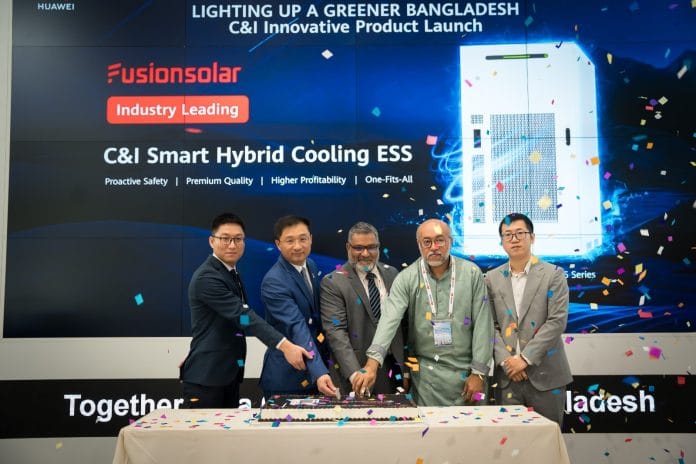Huawei has introduced its next-generation energy storage system in Bangladesh, aimed at enhancing the efficiency and reliability of solar power projects across the country.
The new solution, the Huawei LUNA2000-215 Energy Storage System (ESS), was officially launched at the Huawei Digital Power Partner Summit 2025, held at the Huawei Bangladesh Academy in Dhaka recently. The unveiling was led by Ni Xiaopeng (Liam), Managing Director of Huawei South Asia Digital Power Business.
Huawei’s newly launched ESS is expected to bridge that gap with advanced, intelligent storage capabilities.
The LUNA2000-215 is a highly efficient N+1 generation Liquid/Air Intelligent Cooling Energy Storage System, capable of operating in both on-grid and off-grid modes. In the event of a power outage, the system automatically switches to off-grid mode to maintain uninterrupted supply for critical operations. During standard operation, it can reserve a portion of its charge specifically for emergency backup power.
With a 91.3% round-trip efficiency, the system benefits from optimized regulation and advanced hybrid cooling algorithms. Its Pack-Level Optimization 2.0 technology enhances lifecycle performance by enabling real-time active balancing without the usual charge-discharge restrictions, increasing usable energy by 2%.
The launch event brought together over 100 representatives from engineering, procurement, and construction (EPC) companies, along with key industry stakeholders. Senior Huawei executives—including Wu Ji (Jason), President of Huawei South Asia and CEO of Huawei Bangladesh; Ni Xiaopeng (Liam); and Ren Jianyu (Jamison), Director of Huawei South Asia Digital Power Partner Business—shared insights on the future of digital power solutions in the region.
“Our new energy storage system is designed to significantly improve the efficiency and cost-effectiveness of solar power projects in Bangladesh,” said Ni Xiaopeng. “Through the Huawei Digital Power Partner Summit 2025, we’re building a platform for collaboration that will accelerate the country’s shift toward renewable energy.”
Md. Rashedul Karim, Country Head of EPC partner Kingsun Bangladesh, echoed the sentiment. “Huawei’s new storage solution is a game-changer for our solar sector. It will not only improve performance and energy utilisation but also allow EPC providers to deliver greater value to clients with more reliable and smarter technology.”
Huawei has played a key role in Bangladesh’s renewable energy journey since 2021. Its portfolio includes landmark projects such as a 100 MW solar power plant in Mymensingh, and the country’s first and largest microgrid—a 22 MW system in Monpura Upazila, Bhola. In 2023 alone, Huawei executed over 72 rooftop solar projects across private institutions. The company introduced five new digital power products in Bangladesh in 2024, with the LUNA2000-215 marking its second ESS solution deployed in the country.

